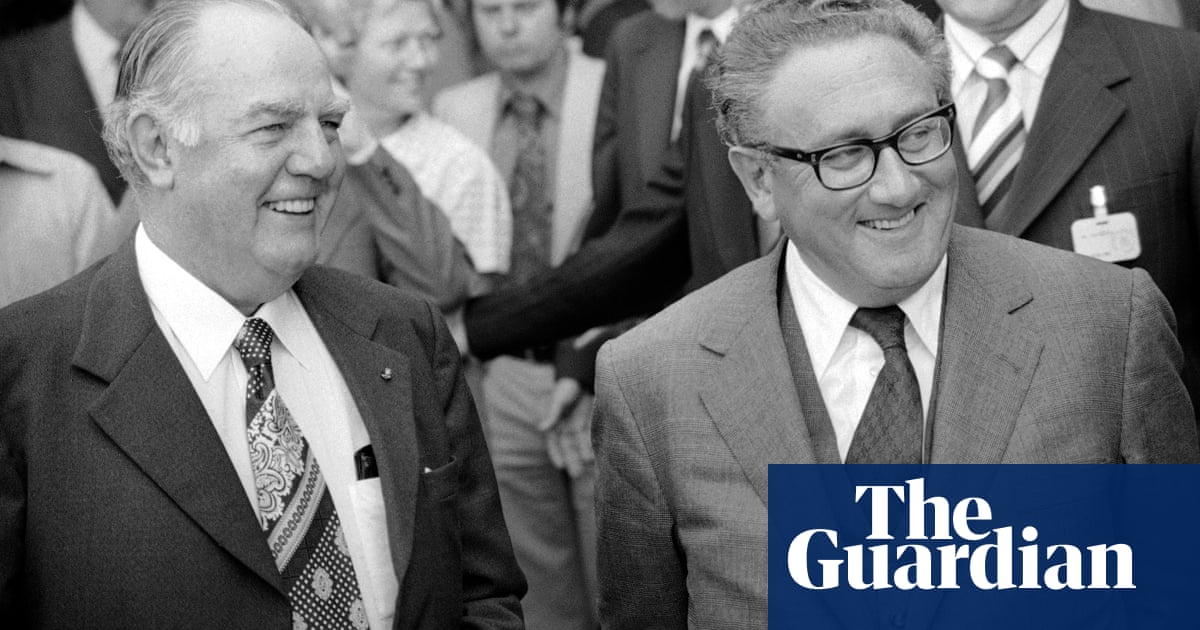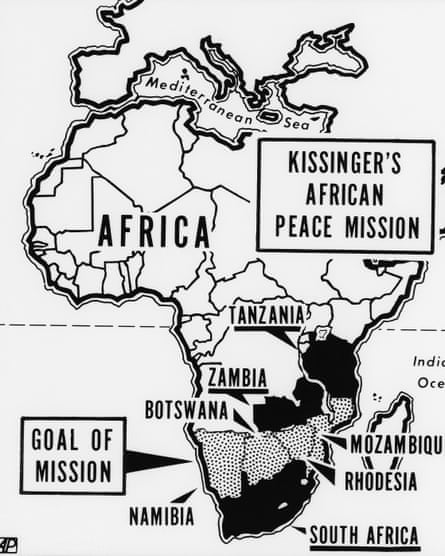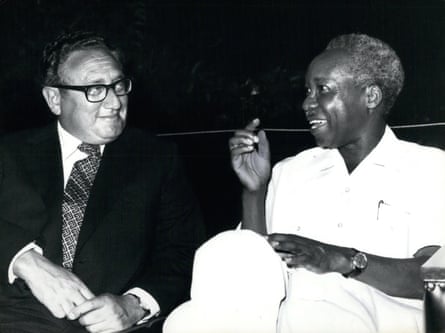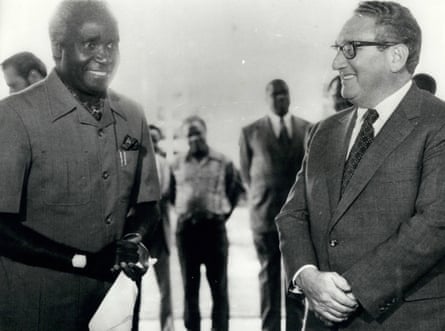
The men who sat down for dinner at the Hotel Bodenmais in West Germany on 23 June 1976 were exclusively white, although the issue to be discussed was the path to majority black rule in Rhodesia. At the table was John Vorster, prime minister of apartheid South Africa. With him were ambassadors, diplomats and security officials. Pride of place, however, was reserved for the US secretary of state, Henry Kissinger, who opened the proceedings with a racially tinged joke.
It was a dinner that took place in the midst of a frantic two-year period when the world’s most high-profile diplomat – who had dismissively ignored Africa for much of his time in office in the Nixon and Ford administrations – was taken with a sudden interest in the continent.

Then, armed with a dangerous cold war logic, he applied himself to successive crises in Ethiopia, Angola and Rhodesia in the search of a quick fix to burnish a reputation that was beginning to be eclipsed.
As Kissinger turns 100 on 27 May, his interventions in Africa have once again come under the spotlight, not only for the multiple failures that emerged from an approach befogged by deception, secrecy and browbeating, but for the long-lasting and dangerous consequences of his efforts in southern Africa in particular.
 Pupils use the Regina Mundi church as a refuge during the student uprising on 16 June 1976 in Soweto, South Africa. Photograph: Gallo Images/Getty
Pupils use the Regina Mundi church as a refuge during the student uprising on 16 June 1976 in Soweto, South Africa. Photograph: Gallo Images/Getty
In the space of a handful of years Kissinger would be involved in a murky intervention in Angola that would complicate the emerging conflict there that followed Portugal’s withdrawal after a coup in Lisbon.
He became the first US secretary of state to visit South Africa in three decades, delivering prestige to the apartheid regime in the aftermath of the Soweto massacre in 1976, when scores of demonstrating schoolchildren and others were gunned down by police.
And while he would strong-arm Rhodesia’s pariah prime minister, Ian Smith, into making a declaration that he would accept majority black rule, it would be a failed initiative undertaken in questionable faith and underpinned by his own sympathies for the white-minority communities who were ruling Rhodesia and South Africa with racist policies.
The consequences, as historians point out, were a hugely prolonged war in Angola and an added lease of life for apartheid.
 Graphic from the time showing the countries on Kissinger’s ‘peace mission’ to Africa. Photograph: AP
Graphic from the time showing the countries on Kissinger’s ‘peace mission’ to Africa. Photograph: AP
In a scathing memoir, written for American Diplomacy in 2010, the former US ambassador to Nigeria, Donald Easum, who served as the assistant secretary of state for African affairs, delivered a withering assessment of Kissinger, describing African ambassadors and representatives at the UN as “routinely rebuffed and neglected” by the secretary of state’s office, and his “disdain” for black Africa.
Kissinger would become engaged by events in Angola where, after a leftwing military coup in 1974 against Lisbon’s Estado Novo dictatorship, the new regime immediately stopped all military action in the African colony, leading to independence in 1975.
Concerned that the Marxist-Leninist People’s Movement for the Liberation of Angola (MPLA) – one of the combatants in the civil war that followed the coup – would sweep to power, opening the way for Soviet influence, Kissinger moved to engage with Africa.
In his memoir, Easum summarised Kissinger’s ambition: “He was determined to seize in Angola what he considered a timely opportunity to display America’s (and Henry Kissinger’s) strength.
“He believed that defeating the MPLA, which he considered pro-Soviet, could expunge the image of a flabby United States in retreat after Vietnam. Moreover, he thought he could do it on the cheap with clandestine CIA collaboration. He was soon to be proved dead wrong.”
He didn’t study Africa. He went in with a very typical racism of the time, a contempt for all developing countries
Nancy Mitchell, historian
If Angola was important – not least after the Cuban intervention to support the MPLA after South Africa invaded and its forces drove almost to the capital, Luanda – it was because Kissinger believed that should Angola fall, neighbouring states could follow, including Rhodesia, ultimately threatening South Africa.
“He had a reputation for being a strategic genius,” says Nancy Mitchell, a historian and author of Jimmy Carter in Africa: Race and the Cold War.
“But if you study what Kissinger did in Angola and Rhodesia, it really sheds a light on the weakness of his entire policy in Africa but also in the Middle East and Vietnam. He misread the situation in Angola from the start. He never expected the Cubans to intervene.”
 Kissinger with Tanzania’s president, Julius Nyerere, in Dar es Salaam, Tanzania, in April 1976. Photograph: Zuma Press/Alamy
Kissinger with Tanzania’s president, Julius Nyerere, in Dar es Salaam, Tanzania, in April 1976. Photograph: Zuma Press/Alamy
Echoing Easum, Mitchell sees the period of Kissinger’s diplomacy in Africa as “very sordid” and damaging, not least his whirlwind tour of African leaders in 1976 – which saw him fleetingly meet Tanzania’s Julius Nyerere and Zambia’s Kenneth Kaunda among others – leaving behind a legacy of distrust.
“He really dismissed the whole continent of Africa until he thought he could get a reputational gain by intervening in Angola and saving it for American influence.
“He didn’t study Africa. He went in with a very typical racism of the time, a contempt for all developing countries, and thought he could get an easy victory, which he needed after the collapse of South Vietnam,” said Mitchell.
“He even said it about himself when he quipped to a British Foreign Office official that it was a mixture of extreme arrogance and naivety.”
skip past newsletter promotion
Sign up to Global Dispatch
Get a different world view with a roundup of the best news, features and pictures, curated by our global development team
Privacy Notice: Newsletters may contain info about charities, online ads, and content funded by outside parties. For more information see our Privacy Policy. We use Google reCaptcha to protect our website and the Google Privacy Policy and Terms of Service apply.
after newsletter promotion
As Mitchell points out, while Kissinger spent hours in talks with Rhodesia’s and South Africa’s white leaders, on his whistlestop tour of black leaders he either failed to meet key players, such as Samora Machel in Mozambique, was unaware of the importance of others – including Robert Mugabe, whose Zanu-PF forces were threatening the white regime in Rhodesia – or spent a mere seven minutes with Joshua Nkomo, Mugabe’s chief rival.
He saw Africa in terms of Europe and as a subtext of European diplomacy
Peter Vale, historian
The consequence was that the leaders of the “frontline states”, who Kissinger needed to persuade to buy into his plan for majority rule in Rhodesia, were either unimpressed or deeply distrustful, undermining his efforts from the start.
There was another issue: Kissinger’s innate sympathies with white minority rule seen through his Eurocentric prism. As Peter Vale, a historian at the University of Pretoria, wrote in a recent essay for the Conversation, where he described Kissinger’s record in Africa as “dismal” and said he “neither ended colonialism nor minority rule in the region”.
He wrote: “Kissinger’s interest in southern Africa in the mid-1970s was predicated on the idea that balance would return if the interests of the strong were restored. He failed to understand that the struggle for justice was changing the world – and diplomacy itself.”
Speaking to the Guardian, Vale described the meeting at the Hotel Bodenmais and what it portended. “The conference was a bunch of white men sitting in Germany. He saw Africa in terms of Europe and as a subtext of European diplomacy.”
 With Zambia’s president, Kenneth Kaunda, in Lusaka, Zambia, in September 1976. Photograph: Zuma Press/Alamy
With Zambia’s president, Kenneth Kaunda, in Lusaka, Zambia, in September 1976. Photograph: Zuma Press/Alamy
That was perhaps nowhere more obvious than in his visit to South Africa, where he persuaded a tearful Ian Smith – in town for a rugby match – to agree to majority rule. As Vale points out, he met only one black South African figure who was critical of apartheid. His visit, he says, was the “high point of apartheid’s diplomacy”.
“What were the harms?” Vale asks. He suggests the visit to South Africa “probably extended the life of the apartheid regime” while contributing to a significant military mobilisation around Angola, which South African forces would invade again in 1987, leading to the battle and siege of Cuito Cuanavale.
Nancy Mitchell agrees. “I think it is very plausible [that Kissinger’s diplomacy in Africa] gave apartheid more years,” she says.
“Since it was felt that Mozambique was also going, the idea was to have a white buffer. It was felt important for white South Africa to stay stable because of trade and minerals. Much of it was a deliberate attempt to buttress South Africa.”
Perhaps the last word should be left for the late Donald Easum, whose memorandums – and those of many other seasoned colleagues in the state department Africa bureau – Kissinger ignored.
“It is impossible to know what might have resulted had Kissinger accepted the policy stances toward Angola of the first two Africa bureau assistant secretaries he hired.
“It is in any case difficult to imagine that their recommendations would have resulted in the kind of nightmare – for Angolans, for US prestige, and for himself – that his bludgeoning of the bureaucracy provoked.”
As Easum notes sadly, it would take “until 2002 for peace to come to that war-racked, landmine-strewn nation”.





GIPHY App Key not set. Please check settings